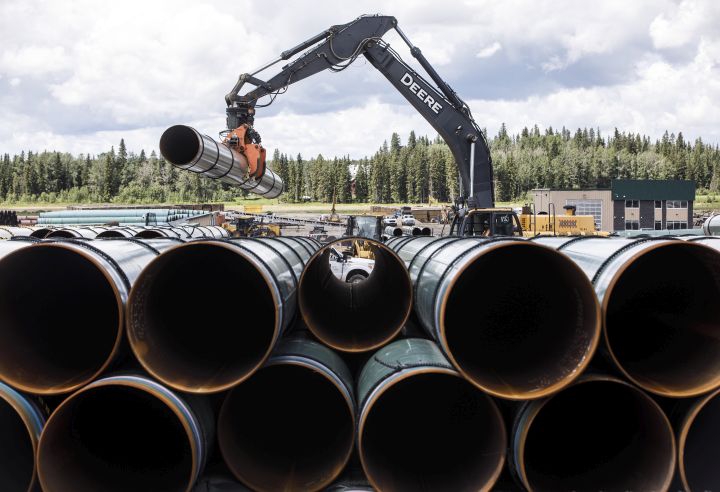The Trans Mountain Pipeline could remain operational for another “30 to 40 years,” according to Liberal candidate Jonathan Wilkinson.

Wilkinson, who is also the current environment minister, made the remarks during an interview with Global News on Sept. 13 about the future of fossil fuels and pipelines in Canada.
“What you’re going to start to see is declining demand for oil over the coming 30 years — 40 years perhaps in the context of some of the developing countries,” Wilkinson said.
“And so, in that context, I would say that the utilization of the Trans Mountain Pipeline is probably in that order of 30 to 40 years.”
Wilkinson said building and operating the Trans Mountain Pipeline expansion, which will increase the existing pipeline’s current capacity from 300,000 barrels a day to 890,000 barrels, will ensure Canadian energy producers receive “full value” for the oil they extract by opening up foreign markets other than the United States.

Keith Stewart, a senior energy strategist with Greenpeace Canada and an instructor of environmental studies at the University of Toronto, said expanding any pipeline at a time of decreasing demand for fossil fuels is illogical.
“When you’re supposedly moving to a zero carbon economy, that doesn’t make a lot of sense,” Stewart said.
“There’s this notion that we can basically get off fossil fuels, and yet somehow continue to export them.”
Wilkinson also said shipping oil by pipeline is safer and more cost-effective than using rail.
“I think sometimes people get a little bit confused between a pipeline, which is simply a transportation mechanism, and the expansion of production,” he said.
“What we have said, in the context of this campaign, is that we will be capping oil and gas emissions in this country and we will be requiring binding five-year reductions on a pathway to net zero by 2050.
“What that essentially says is you’re not going to see a significant expansion in the oil and gas sector in Canada.”
World ‘must’ get off fossil fuels
- Roll Up To Win? Tim Hortons says $55K boat win email was ‘human error’
- Ontario premier calls cost of gas ‘absolutely disgusting,’ raises price-gouging concerns
- Bird flu risk to humans an ‘enormous concern,’ WHO says. Here’s what to know
- Election interference worse than government admits, rights coalition says
Scientists and environmentalists agree that in order to avoid the worst and most catastrophic effects climate change has to offer — such as extreme heat waves, wildfires, droughts and flooding — humanity needs to get off fossil fuels, fast.
A report recently published in the journal Nature said 84 per cent of Canada’s 49 billion barrels of proven oil sand reserves, and nearly two-thirds of global oil supplies, must remain “unextracted” to avoid temperatures rising 1.5 degrees Celsius above pre-industrial levels. That target was set at the 2015 Paris climate change summit.
At present, Canada’s oil sands produce about three million barrels of oil a day, according to Natural Resources Canada. At that rate, according to the Nature study, Canada would exceed the total amount of oil it can extract without exceeding its Paris Agreement targets sometime in early 2029.
“Canada’s resources are really expensive to extract, in addition to having a super high carbon intensity,” said Caroline Brouilette, domestic policy manager at Climate Action Network Canada. “In a global market, where demand has to decrease, those resources that are the most expensive and most polluting will have to be the first one to stay in the ground.”

The International Energy Agency (IEA), which offers advice to national governments on energy policy, issued a report in May that outlined a “pathway to net-zero” greenhouse gas emission by 2050. The report included no new oil, gas or coal projects anywhere on Earth and emphasized the “far-reaching implications” this will have for fossil fuel-producing countries, such as Canada.
Meanwhile, the UN Intergovernmental Panel on Climate Change published a report on Aug. 9 that said world leaders need to dramatically accelerate efforts to reduce greenhouse gas emissions and set more ambitious targets if the deadliest consequences of climate change are to be avoided.
Fierce debate over Trans Mountain
The Trans Mountain Pipeline, which the Liberal government bought for $4.5 billion in 2018 during its first term in office, was fiercely contested during both the French and English leaders’ debates on Sept. 8 and 9.
If completed, the project could carry tens of millions of barrels a month of Alberta bitumen across the Rocky Mountains to the Pacific coast.
Liberal Leader Justin Trudeau said he’d keep the yet-to-be-finished pipeline expansion open until “we don’t need it anymore” when pressed on whether he’d shut it down if re-elected. He said there are Indigenous groups that would like to buy the pipeline from the government and who are interested in operating it.
NDP Leader Jagmeet Singh said he’s “always been opposed” to the project during the French debate. But when pressed on what he’d do if the NDP forms government, he refused to say whether he’d terminate the pipeline.
Instead, Singh said an NDP government would look at the project and make a determination about what to do at some point in the future.

Conservative Leader Erin O’Toole, meanwhile, said during the English debate that people in Western Canada deserve an economic recovery that includes fossil fuels.
During the English debate, O’Toole said every barrel of oil not produced in Canada is a barrel of oil that Saudi Arabia, Venezuela or Russia will make.
“We have to recognize that Canadian energy is an environmental and social leader in comparison with other energy producers,” Conservative Party spokesperson Mathew Clancy said in a written statement.
“We also need to continue to support and grow the model of Indigenous partnership and Indigenous equity ownership in our resource development.
“Over time, as we see a lower carbon future, we should make sure that democratic countries use Canadian resources and not resources from Saudi Arabia or Venezuela or Russia.”
Of all the major political parties in Canada, the only one that’s said it will shut down the Trans Mountain Pipeline is the Green Party.
Green Party Leader Annamie Paul said during the debates that she’d ban all future oil and gas expansion projects, ban hydraulic fracking and cancel the Trans Mountain Pipeline. This is in the party’s platform, too.
Paul also said Canada must go beyond the current target set by the Liberals of a 40 to 45 per cent reduction in greenhouse gas emissions compared with 2005 levels by 2030 to keep global warming to a minimum.
The Green Party has pledged to reduce emissions by 60 per cent compared with 2005 levels by the end of the decade, the NDP has promised 50 per cent and the Conservatives have promised 30 per cent.





Comments